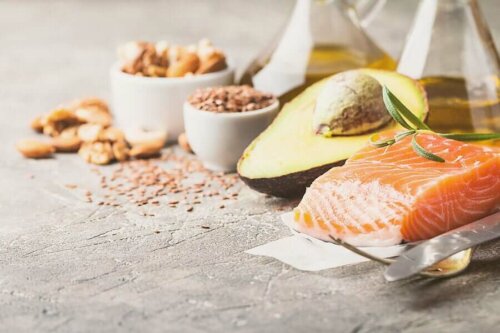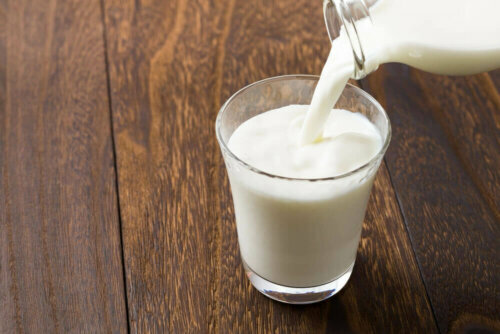How to Reduce Your Carb Intake to Lose Body Fat


Reviewed and approved by Doctor Carlos Fabián Avila
Eating carbs is one of the most worrying aspects when it comes to wanting to lose weight. For that reason. it’s normal for people to want to better inform themselves about it to put a suitable strategy in place to reach their objective. However, they don’t always reach it. Keep reading to discover how to reduce your carb intake to lose body fat!
To find a suitable weight loss strategy it’s important to consult a nutrition and diet expert, as well as a doctor. Losing weight isn’t a question of removing food from your diet, depriving yourself of everything, and adopting other extreme measures. In reality, it’s about learning to know your body better and understanding what’s best for you and why.
Eating a diet with some moderate carbohydrate content is an essential part of nutrition for anyone who wants to stay healthy.
Including different sources of carbohydrates, moderately, within a healthy and balanced diet is in your diet is essential for achieving optimum physical and mental performance.
Advice to reduce your carb intake
When it comes to losing body fat, many people have the idea that it’s necessary to limit how many carbs you eat. With that in mind, many people make the mistake of cutting them out of their diet completely, without understanding that it’s not really necessary.
You have to learn to reduce some sources (like sources of simple carbohydrates) and, alternatively, opt for others (like sources of complex carbs).
It’s also a good idea to put some diet tricks into practice. These will help you to improve your eating habits and to reach your objectives, without risking your health. Let’s take a look at some of those below.
1. Avoid drinking sugary drinks helps to reduce your carb intake

All industrial drinks, from fruit juices to sodas or soft drinks are harmful to our health. They’re unable to provide anything other than empty calories and it’s a good idea to reduce how often you drink them (or eliminate them completely, which would be the best option).
When you drink these drinks, your body has an anxious reaction that, almost always, leads you to consuming more sources of simple carbohydrates.
Alternatively, the high sugar content affects metabolic function and among other things, causes:
- Increased resistance to insulin
- Tendency to develop type 2 diabetes
- Risk of becoming overweight or obese
2. Eat more vegetables
Increasing the number of non-starchy vegetables (like tomatoes, beetroots, carrots, and leafy green vegetables) you eat each day will help you to significantly reduce your desire to eat more carbs than is necessary.
These foods contain high levels of dietary fiber and antioxidant compounds that, aside from improving digestion, also increase your metabolic rate and reduce your desire for more food.
We offer this recommendation because these foods have high levels of dietary fiber and antioxidant compounds that, in addition to improving digestion, increase your metabolism and reduce anxiety around eating.
3. Eat more healthy fats to reduce your carb intake

Increasing your intake of foods rich in healthy fats is an excellent way of reducing your carb intake you eat without affecting your body’s energy levels. This type of nutrient is essential for the metabolism to work well and also contribute to making you feel more full.
Some of the best sources are as follows:
- Avocados
- Nuts
- Oily fish
- Extra virgin olive oil
- Seeds (chia, linseed, sunflower)
4. Make sure you’re eating enough protein
Although much has been said of proteins, today they are recognized as essential for good health and body weight.
Foods that contain this nutrient should make up 35% of your daily calories, and if possible should be included in your first meal of the day. Given their high energy content, they will help you to perform better and support your metabolism.
You can find high biological proteins in:
- Eggs
- Vegetables
- Nuts
- Lean meats
- Oily fish
- Whole-grain cereals
5. Choose whole-grain foods
Although whole-grain foods contain carbohydrates, eating them supports the process of eliminating body fat and gives the body energy. This is because they are complex carbohydrates. Compared to simple carbohydrates, the body finds it easier to absorb these.
Also, these foods contain fiber, antioxidants, and other essential nutrients that contribute to improving physical and mental well-being.
6. You can drink cow’s milk

Contradictory to what specialists had previously claimed, consuming cow’s milk isn’t harmful when it comes to losing weight. Manuela Juárez, chemist and teacher of investigation at the Institute of Food Sciences of the Higher Council for Scientific Research (Instituto de Ciencias de la Alimentación del Consejo Superior de Investigaciones Científicas (CSIC)), notes the following:
“Milk doesn’t cause weight gain. That’s a lie. The seroproteins that milk includes help to satiate. For that reason, it’s a good choice for weight loss. Also, whole milk has fatty acids that when we consume them aren’t synthesized or added to adipose tissue.”
Alternatively, with a doctorate in Pharmacy, and a career as a nutritionist and scientific advisor Marián García in charge of Boticaria García, notes that although secicalists recommend you drink milk, you can also enjoy other drinks like “vegetable milks”.
If you want to reduce your carb intake, get assessed first
Reducing your carb intake isn’t always easy if you have certain dietary habits. However, by bearing these recommendations in mind, you can limit your intake and lose body fat more easily.
Designing a healthy diet with controlled calorie intake is the best way to fight excess weight.
Be sure to include all food groups in your diet!
All cited sources were thoroughly reviewed by our team to ensure their quality, reliability, currency, and validity. The bibliography of this article was considered reliable and of academic or scientific accuracy.
- Paoli, A., Rubini, A., Volek, J. S., & Grimaldi, K. A. (2013). Beyond weight loss: A review of the therapeutic uses of very-low-carbohydrate (ketogenic) diets. European Journal of Clinical Nutrition. https://doi.org/10.1038/ejcn.2013.116
- Shai, I., Schwarzfuchs, D., Henkin, Y., Shahar, D. R., Witkow, S., Greenberg, R., … Stampfer, M. J. (2008). Weight loss with a low-carbohydrate, mediterranean, or low-fat diet. Obstetrical and Gynecological Survey. https://doi.org/10.1097/01.ogx.0000334740.32446.f3
This text is provided for informational purposes only and does not replace consultation with a professional. If in doubt, consult your specialist.








